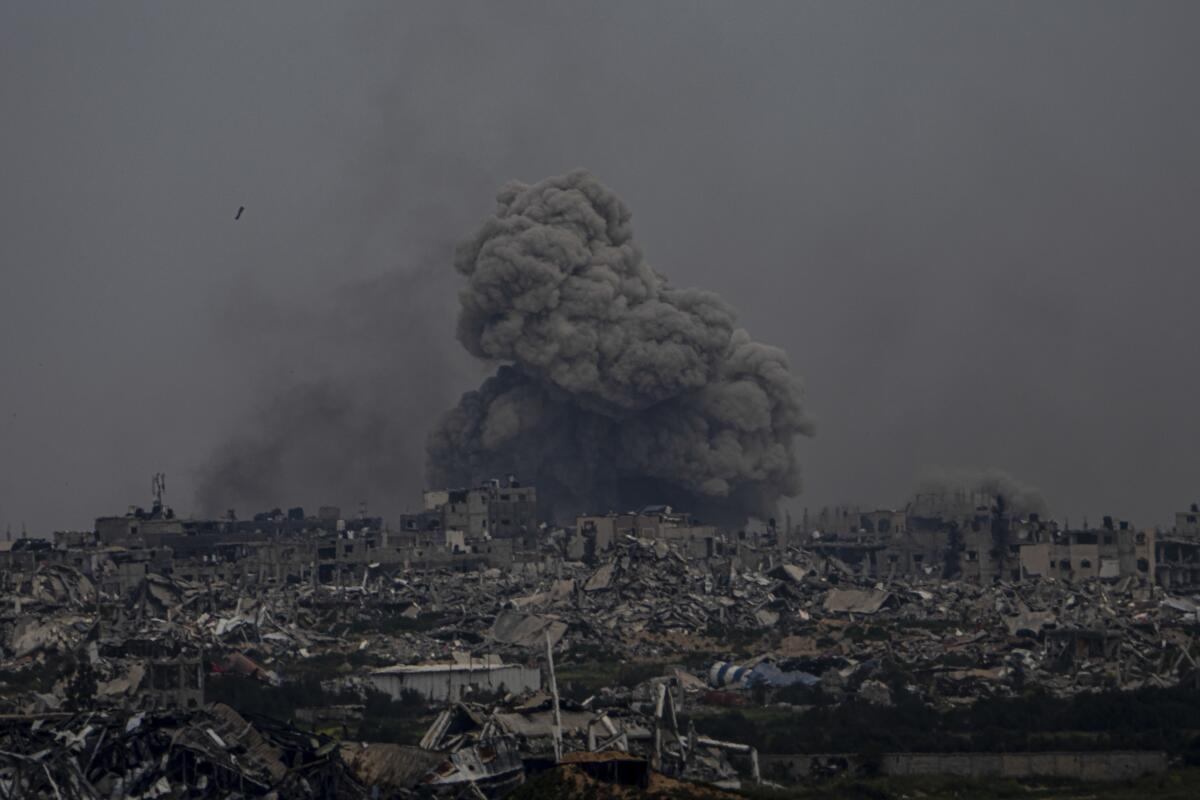U.S. Gaza resolution is vetoed at U.N. as Blinken fails to achieve breakthrough in Israel

- Share via
WASHINGTON — Seeking to distance itself from the growing carnage in Gaza, the Biden administration was stymied on two fronts Friday.
Russia and China vetoed a U.S.-backed resolution at the United Nations calling for an “immediate and sustained” cease-fire in the Gaza Strip — a turnabout from previous U.S. vetoes of measures aiming to bring a halt to nearly six months of fighting between Israel and the militant group Hamas.
The U.N. vote came as Secretary of State Antony J. Blinken was in the midst of his latest mission to the region since the war broke out following a Hamas-led attack on Israel in October. But Blinken made little visible headway in trying to stave off an Israeli ground incursion in Rafah, a southern Gaza city that is jammed with Palestinians displaced by Israel’s relentless bombardment.
The Biden administration has been on an increasingly combative footing with Israeli Prime Minister Benjamin Netanyahu over the conduct of Israel’s offensive, which has killed some 32,000 Palestinians in Gaza, according to health officials there. Israeli officials have repeatedly dismissed or ignored U.S. entreaties not to harm civilians and to allow a better flow of humanitarian aid into the seaside enclave.

The Gaza war is beginning to play a notable role in U.S. domestic politics. As the war has dragged on and the Palestinian civilian casualty count has soared, President Biden has come under heavy fire from the progressive wing of his own party. Many young voters strongly reject U.S. backing for Israel as it expands its attacks.
With the 2024 presidential campaign in full swing, former President Trump is painting American Jews as “very disloyal to Israel” if they support Biden as he seeks to exert pressure on Netanyahu.
The U.N. Security Council resolution, in calling for an immediate halt to fighting, was meant to facilitate urgently needed deliveries of humanitarian aid to Gaza, where international groups have warned of looming famine in the north.
Nearly all of Gaza’s 2.3 million people have been displaced from their homes, and large swaths of the enclave have been flattened by Israeli strikes. Disease and hunger are rampant.
But the U.S.-backed effort broke down over Russia’s accusations that the U.S. was “misleading” the international community through language contained in the resolution. The wording, which stressed the “imperative” for a cease-fire, also backed diplomatic efforts to secure the freedom of the remaining hostages among some 250 seized during the Hamas-led attack on southern Israel. The attack killed about 1,200.
With family trapped in Gaza, two Palestinian friends in the West Bank hold each other up amid crushing grief.
In Tel Aviv, Blinken held more than two hours of talks Friday with Netanyahu, who has made known his displeasure with depictions of him as an impediment to peace, made in a speech a week ago by the highest-ranking Jewish elected U.S. official, Senate Majority Leader Charles E. Schumer of New York. Biden said he thought his fellow Democrat’s speech was “good.”
Netanyahu said after meeting Blinken that he had turned aside U.S. appeals to cancel plans for a ground invasion of Rafah. Israel has said for weeks it will go after Hamas fighters there, despite a chorus of international condemnation over the danger to civilians.
Netanyahu declared that there was “no way to defeat Hamas without entering Rafah,” adding that he informed Blinken that Israel would not be deterred by U.S. opposition.
“I hope we will do this with the support of the United States,” the Israeli leader said. “But if necessary, we will do it alone.”
Religious Zionists, most believing in a divine right to govern, now have outsize influence in Israel. The war in the Gaza Strip is energizing their settlement push.
Blinken reiterated U.S. support for the overarching goal of defeating Hamas. But speaking later to reporters in Tel Aviv, he used unusually blunt language to say attacking Rafah is“not the way” to guarantee Israel’s security.
“It risks killing more civilians, it risks wreaking greater havoc with the provision of humanitarian assistance, it risks further isolating Israel around the world and jeopardizing its long-term security and standing,” Blinken said.
At the U.N., 11 members of the Security Council supported the U.S.-sponsored resolution, but the measure failed due to the “no” votes by two permanent members who wield veto power, Russia and China. Algeria also voted against it, and Guyana abstained.
Until now, the Biden administration has repeatedly moved to shield Israel from cease-fire calls at the world body, saying the country had a right to defend itself after the Oct. 7 attack. The U.S. also sought to directly link cease-fire calls to demands to free the hostages, of whom about 100 are believed to be alive.
The Security Council defeat was especially stinging for the Biden administration. In an effort to evince a more neutral position that had greater sympathy for the Palestinians, amid domestic pro-Palestinian uproar, U.S. officials sought to put forward a resolution that prioritized a cease-fire.
But China and Russia were keen to be the spoilers.
The U.S. ambassador to the United Nations, Linda Thomas-Greenfield, said their votes were “petty” and “deeply, deeply cynical.”
“First,” she said at the U.N. headquarters in New York, “Russia and China still could not bring itself to condemn Hamas’ terrorist attack on Oct. 7. ... Russia and China refuse to condemn Hamas for burning people alive, for gunning down innocent civilians at a concert, for raping women and girls, for taking hundreds of people hostage.
“The second reason behind this veto,” she continued, “is not just cynical, it’s also petty. Russia and China simply did not want to vote for a resolution that was penned by the United States, because it would rather see us fail than to see this council succeed.”
Blinken was not faring better in Tel Aviv. The schism between the Biden administration, advocating for an easing of the war, and Netanyahu, who is determined to carry the military operation to its end and “destroy” Hamas, has grown.
Separate from his meeting with Netanyahu, Blinken spoke to Israeli President Issac Herzog, “emphasizing the need for Israel to take all possible measures to protect Palestinian civilians in Gaza — including through the prompt, effective facilitation of critical humanitarian assistance throughout Gaza,” according to the State Department.
The statement used unusually tough language for dealing with an ally. Herzog is seen as more moderate than Netanyahu but has not shown a willingness to advocate for easing the military operations.
Meanwhile, talks over the fate of the hostages, and the potential for a cease-fire during which some swap would be made and aid rushed in, continue in the Qatari capital of Doha.
Israel and Hamas do not deal directly with each other; U.S., Qatari and Egyptian officials are acting as interlocutors. The U.S. director of the CIA, William Burns, was reported to be participating, along with the director of Israel’s Mossad intelligence service.
Blinken expressed optimism that the Doha talks could lead to an accord,although negotiators were unable to clinch such a pact prior to the Muslim holy month of Ramadan.
“We’ve gotten it down to a few remaining gaps,” he said. “But the closer you get to the goal line, the harder that last yard is.”
More to Read
Sign up for Essential California
The most important California stories and recommendations in your inbox every morning.
You may occasionally receive promotional content from the Los Angeles Times.
















